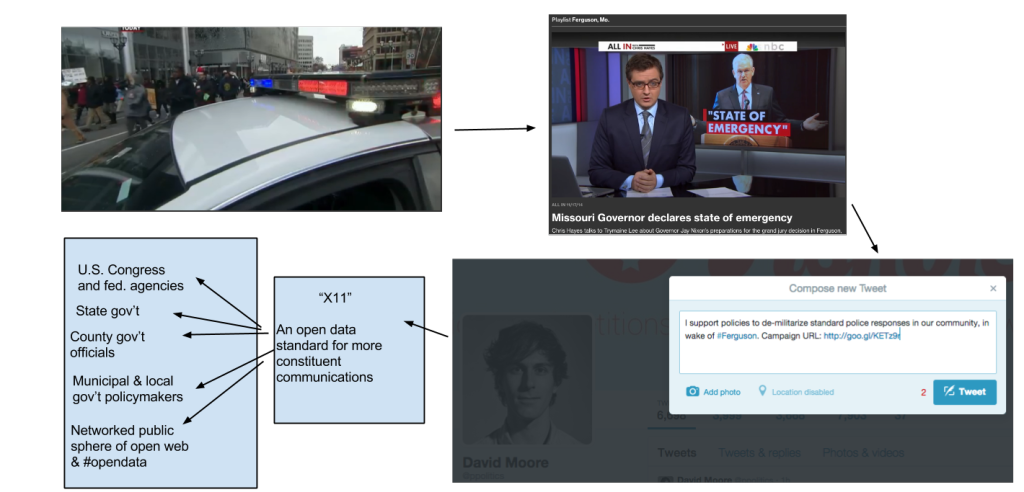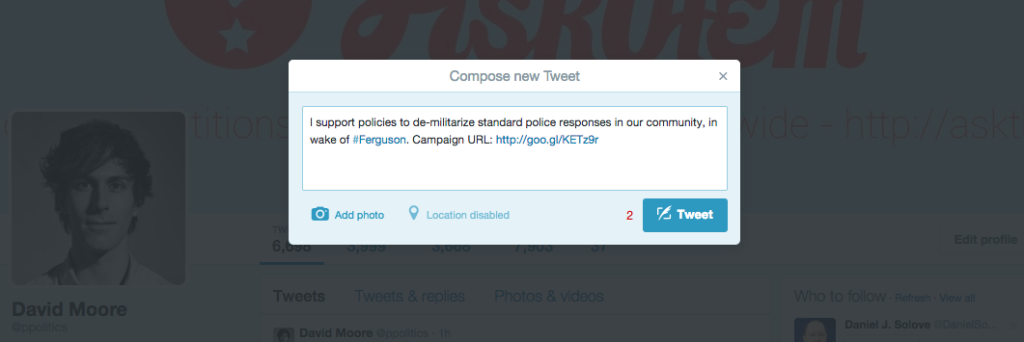tl;dr: an open data standard for political information, “X11”, could channel public sentiment out of closed social media and into open structured data for policymakers.Â
We have proven data standards and ready partnerships, but we need charitable funding support to develop this program and launch it publicly.Â

Open data standards, such as our proposed “X11”, can translate individual closed social media updates into open public data.
1. The terrible events in Ferguson, MO this past summer around the death of Michael Brown, and ongoing police overreaction & elected official obfuscation, have justifiably prompted a national conversation about police militarization & systemically racist criminal justice outcomes.
- It’s a terrible cause, one that Missouri elected officials have repeatedly demonstrated their lack of public accountability in addressing, it’s been a continuing tragedy.
- Background news video on MSNBC’s “All In with Chris Hayes” – here’s a micropublishing #Ferguson list by NewsHour, to which one can subscribe, and one from Vox Media, Â with St. Louis Alderman Antonio French often cited as a leading source, def. follow him.
2. From this tragedy, millions of people have been activated and compelled to political action and education on reform – but so much of it is happening on closed, commercial social media services, such as Facebook & Twitter.
- This is better than many alternatives. I’m not bearish on social media protest, solidarity, even so-called hashtag activism.
- But it fails to fully harness the potential to use this justified outrage to further the causes of reforms in communities – esp. in Missouri, but really, nationwide. Open tech can do more to help organizers & government policymakers drive results.
3. Free & open technology can channel individual, publicly-shared social media posts into open, structured data. Call it “X11” – like 311 place-based issue-reporting to government entities (e.g. of potholes), but for more civic actions: feelings, questions, statements of policy support, volunteer opportunities, expertise, priorities, informational resources, a prompt for a public debate by officials, specific reform initiatives, and more.
- X11 data – and the human conversation and news around it – can then be delivered into government entities at federal, state, county, city and local levels. It can be used by criminal justice activists to organize supporters, and by organizations to allocate volunteer expertise & other resources between supportive individual advocates.
- X11 data can be used by policy reformers to advance legislation to de-militarize police in more counties affected by poor public trust in police relations and outcomes. It can be used by neighborhood leaders, government watchdogs and especially the press & bloggers to increase accountability and ask good, timely questions of police officials. All towards a more-networked public sphere.
4. From an individual user’s point of view, X11 wouldn’t change her social media user experience – she would simply post a hashtag, such as #Ferguson, in a Facebook or Twitter update, along with the URL to a campaign webpage (to signify her stance on an issue) that complies with the open X11 standard. With the open-source technology we seek to develop, this would be enough for a nonprofit X11 service (and others) to capture her position on the issue, locate her in her knowable jurisdictions, and batch it for delivery to all her government offices that are able/willing to intake that standard for constituent communication. (A user could still have non-public FB / Twttr pages, of course, wherein updates would stay private.) From there, there’s a wealth of analytics & CRM innovation for following-up and closing-the-loop from the X11-enabled Facebook post, but I’ll hold off on that for another time – but huge opportunities.
- To identify a FB or Twttr user as a constituent in a given county in a state, or a U.S. Congressional district, we have concrete proposals, and increasing free APIs about voter registration info are coming online. (There are also paid services.)
5. To deliver this individual’s support of reform efforts into her federal, state, county and city government offices, it requires an open data standard for constituent communication. Daniel Bennett of Citizen Contact and PPF have a working, tested draft of this flexible-enough but machine-readable standard – we have the basics of what we need, and enough experience working with government offices to support their ability to intake this standard.
- We presented the basics in a session at Transparency Camp in D.C. this spring, and I’ve written proposals about it since this spring here on PPF Blog – it would also work for any site that wanted to deliver a digital message to Congress, whether commercial sites like Change or startups like Countable or groups like MoveOn or public resources like OpenCongress or Councilmatic.
- The result would be a wealth of newly-surfaced public data about constituent sentiment, as well as potential for brand-new data visualizations and analysis of policy opinions and demands for reform.

Sample social media update, w/ topic hashtag, connected to campaign URL, to be delivered via open data standards.
6. If open data standards for constituent communication can deliver tens of millions of individual political actions as open structured data from social media into government, why doesn’t this exist yet in the U.S.? Why isn’t this a large, open-data community project with documented public-benefit outcomes, harnessing technology for accountability in systems of power headed into 2015? Because our nonprofit PPF doesn’t have funding support to develop this open standard, because other #opengov / #civictech nonprofits aren’t focused on enabling grassroots activism in their mission, because many issue-based groups guard their lists jealously, and because commercial stakeholders aren’t incentivized to support or develop it.
- PPF is a tiny 501(c)3 non-profit organization, seeking charitable funding support to build popular free & open-source tools for civic engagement, and does not have major funders on our Board of Directors.
- Other U.S. #opengov & #civictech nonprofits are interested in social issues around #Ferguson, and many members of their communities are volunteering on open tech support for activism, but their mission – and that of their major funders – is not to build tools and infrastructure for activists and advocates to pressure government from the outside, and channel public opinion into policy outcomes.
- Some issue groups would balk at encouraging their members to post a hashtag and a link to their own campaign page URL on social media, because then, with the open data and tech services PPF proposes, their allies and rivals and opponents could see public data on how many members in, say, St. Louis or Missouri or the American Midwest posted the #Ferguson hashtag. Transparency at this level of group membership is rarely practiced in activism, but the benefit of such a culture change would strongly force elected officials in state and county and city (and someday federal) governments to respond with action to shows of popular sentiment for reform.
- Twitter & FB are incentivized to keep users on their services and returning for engagement on their pages. Commercial vendors of CRMs for delivery of petition signatures and grassroots messages into government are incentivized to keep up the arms-race of un-transparent delivery protocols. Many government entities don’t want these standards, because it would open up pressing questions about why their police forces haven’t adopted best-practices in community relations and de-militarized in their standard responses to peaceful protests.
If you’re a philanthropist, or a program officer at a foundation, who wants to see all the energy of Ferguson channeled into ongoing policy-reform efforts, and to harness younger social media users into diverse organizations for criminal-justice reform and community self-governance, help PPF by funding this non-profit, open data standard. If you’re an open-data evangelist and would like to help create these potentially huge new sets of open public data to analyze and visualize, help fund our work. We’ve proposed this as an open public resource for years, since we developed Contact-Congress on OpenCongress in 2011 and before – it could have already existed for years, ahead of Ferguson – and hope that a foundation with a commitment to civic engagement will see the potential for the networked public sphere and underwrite our work. Fulfilling the promise of free & open technology for more direct everyday participation in our representative democracy.
Help us with funding to start on “X11” standards and services now – I’m david at ppolitics.org, @ppolitics on Twitter. Or all this action will once more dissipate into the ether, vibrating only in walled gardens of social media, and untold transformative civic potential will have evaporated yet again. Really solid public-benefit proposals such as this don’t just automatically receive charitable funding support; there’s a landscape of nonprofit tech philanthropy, and we’re looking to carve a hugely-valuable niche for civic engagement infrastructure like X11. It’s a huge open-data idea, just looking for funding to get rolling.
And then in parallel with criminal justice reform, open data standards can more-effectively harness policy outcomes on issues such as catastrophic climate degradation, immigration reform, public education & health care, campaign finance reform and more.